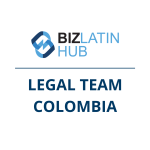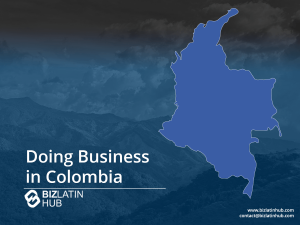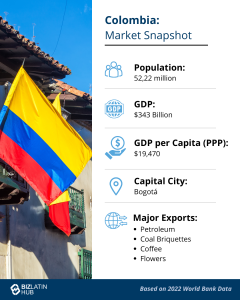A business that wants to enter the consumer packaged goods (CPG) market in Colombia, with products in tobacco, personal and home care, food, or beverages, initially has to consider whether it would be advantageous to fully establish a business presence in Colombia, or whether a route-to-market through distributors could be established without a physical presence in the country.
Market Entry – Consumer Packaged Goods Market in Colombia
How to Set Up Business in Colombia?
Colombian law provides several means by which foreign companies can engage in permanent commercial operations in Colombia. The three most commonly used legal structures are the opening of a foreign company branch (FCB) and the incorporation of a share corporation (SA) or forming a simplified stock company (SAS). Setting up an SAS company requires registering with the local Chamber of Commerce.
If you are only considering exporting consumer packaged goods to Colombia, then to be successful you will probably need to employ an agent or distributor.
What Are the Advantages and Disadvanatages of Setting Up a Physical Presence in Colombia?
One advantage of establishing a physical presence in a country is that it gives a business complete control, especially when it comes to hiring staff, controlling costs, and setting up distribution centres and manufacturing establishments. However, a disadvantage of establishing a physical presence from the get-go, may be a drain on finances and resources in the first instance. Importing only through distributors and agents has the advantages and disadvantages almost inversed as employing a third party will raise the cost of your products in the market, and you will also lose some control over sales and/or marketing.

An advantage for both setting up a physical presence and importing consumer packaged goods is the ability to utilise existing distributors within an already established distribution chain. Distributors are familiar with local requirements, whether it is national or regional distribution. Without a physical presence your business will have someone on the ground to look after your interests through distributors and agents, but in the long-term, as sales develop, it would be recommended to establish a representative office or some other form of permanent representation. The reason being is that distributors may not always be able to give your consumer packaged goods the attention they deserve and there may be a risk of others imitating your packaged goods. It is highly recommended for a business to consider trademarking its distinctive brand and products.
What Is the Market Landscape in Colombia?

To enter the consumer packaged goods market in Colombia, a business should be aware of the market landscape of Colombia as it is distinctive within LATAM countries. Colombia is different to other LATAM countries because of its regional and decentralised nature caused by its geographical characteristics, such as the Andean mountain range and Amazonian rain forest and, additionally, a relatively underdeveloped infrastructure. As such, markets in Colombia have evolved in a very regional way. Another related point is Colombia’s administrative structure with its ‘departments’ resembling a federal system and power being devolved locally. As such, it is recommended to penetrate the Colombian consumer packaged goods market through a network of regional distributors.
How to Develop a Market Entry Strategy?
Once you have undertaken thorough market research and conducted detailed analysis of the data, you should set out a market entry strategy to enter the consumer packaged goods market in Colombia.
Four Key Factors to Consider:
- BUSINESS CONTACT: Make direct contact with shortlisted distributors, sellers and partners. Contact through a local business for commercial representation could save you precious time, resources and finances. You will need to identify the agent or distributor that is right for you, but staying in contact is essential to ensure success, and to stay on top of market trends. Building good working relationships with agents and distributors should be a priority.
- LOCALISATION: Understand the local environment and culture. Do your package goods have to be changed to meet local tastes and conditions? Are you developing new packaged goods or selling the same packaged goods in the new market?
- AWARENESS: How much awareness is there of the packaged goods, the brand and even the category? Do consumers need to be educated on how to use it?
- LOCATION: Where in Colombia will your market entry commence? The capital Bogotá, a specific region, or nationwide? Are test phases in a few locations applicable?
- TIMING: Entering an established market can allow your business to replicate success, but also improve on current strategies and packaged goods already in the market. Being first in the market offers first mover advantage, and your business could set the rules of the market and build brand loyalty. The downside of seeking first mover advantage is that it could be a high cost, and a high-risk strategy.
What Is the Status of the Consumer Packaged Goods industry In Colombia?
In the Consumer Packaged Goods industry in Colombia, consumer preferences are constantly changing and there is stiff competition for new market entrants. It is for this reason that your business has to build competitive advantage through timely market entry, competitive intelligence, and consumer insights. Building business intelligence can be achieved through a combination of reviewing your product and service information, and conducting detailed market research on the Colombian market. One option to ensure that your market entry is successful is to hire a local firm with expert local knowledge to support your venture through expert legal advice.
What Does Recent Research Advise About the Consumer Packaged Goods Industry in Colombia?
Consumer needs and habits are changing, and Consumer Packaged Goods companies can no longer make the same assumptions about mass-market shopping activity. Especially when businesses want to enter the consumer packaged goods market in Colombia with its varying markets.
In Colombia, consumer packaged goods have to be varied to cater for all demographics, such as small families, young professionals, millennials and those with hectic lifestyles. Research indicates that individual pack sizes gained importance in 2015 due to these factors. These demographics, who have become financially independent in Colombia, are demanding smaller sized packaged goods. The idea of hectic lifestyles has forced the development of “portable products” and products that are packaged in resealable packaging, such as zip locks, to accommodate for sporadic and on-the-go use.

Specific to Colombia, consumer packaged goods such as milk and water can still be purchased in plastic pouches or bags. However, changing trends with a stronger competitive environment and higher expectations from consumers has led to increased use of plastic for beverages, especially non-alcoholic drinks, and cartons for milk. In the past, a significant share of products used to be packaged in plastic pouches and glass bottles. The use of plastic bottles offer consumers more convenience when they are on-the-go or require a smaller sized product. Although, in the case of milk, plastic pouches remain strong when purchased as multipacks. On the same basis, consumer packaged goods in the form of refills have been on the rise since 2015, especially in home care products. This is due to consumers seeking value for money.
Find Out More About Entering the Consumer Packaged Goods Market in Colombia with Biz Latin Hub
There are many opportunities for selling consumer packaged goods in Colombia from tobacco, food, beverage, home and personal care. It can sometimes be challenging due to the complexities of market entry and cultural differences. Biz Latin Hub is uniquely placed to help you and your business, not only identify your optimal route-to-market, but we can also support you with full back-office services as you implement your market entry strategy. Our mission is to facilitate and support businesses in Colombian markets with the help of our experienced team of accountants and lawyers. Please feel free to contact us now to receive comprehensive advice about doing business in Colombia.
If you want to learn how we can help your business, check out our video below!






